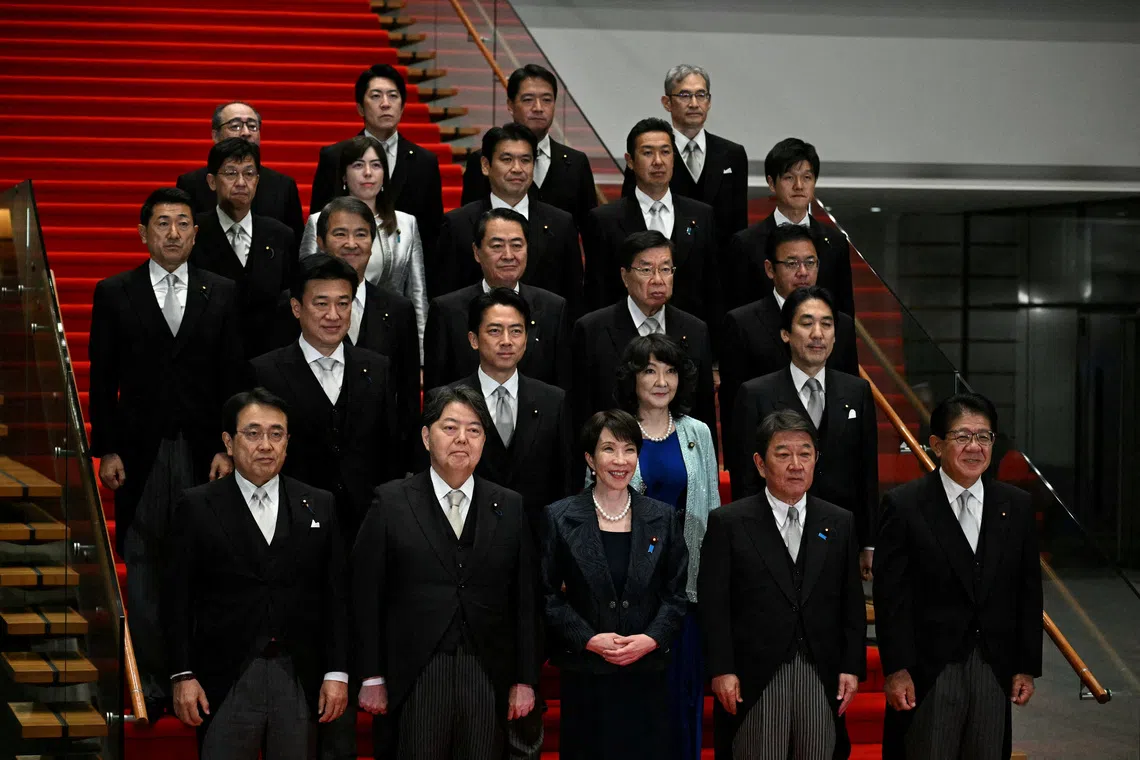News analysis
Japan’s new coalition eyes big spending but not Abenomics 2.0
Sign up now: Get ST's newsletters delivered to your inbox

Japan’s new Prime Minister Sanae Takaichi is governing with a policy-conservative partner in Ishin.
PHOTO: REUTERS
Follow topic:
TOKYO – The new junior party in Japan’s ruling coalition is likely to give Prime Minister Sanae Takaichi the green light she needs for a big spending package, but will stop short of supporting a revival of Abenomics-style fiscal and monetary policies.
Ms Takaichi became Japan’s first female prime minister
The partnership brings Ishin, which supports tax cuts and wealth distribution but focuses mainly on cutting red tape and wasteful spending, into government for the first time.
Ishin’s preference for small government contrasts with opposition parties that call for payouts and tax breaks, and may serve as a counter-weight to Ms Takaichi’s bias towards big spending.
“Ishin advocates small and efficient government in contrast to Takaichi, who has championed expansionary fiscal and monetary policy,” said Mr Takahide Kiuchi, an economist at Nomura Research Institute. “Cooperation with Ishin could temper Takaichi’s policy instincts and lead to a more balanced economic approach.”
To be sure, Ms Takaichi is seen deploying a package of spending that exceeds former premier Shigeru Ishiba’s 13.9 trillion yen (S$118 billion) plan compiled in 2024, government sources have told Reuters.
The package will include measures agreed upon by the two parties such as petrol tax cuts, subsidies to curb utility bills and tax breaks for households.
But Ishin has backed down on its earlier calls to temporarily freeze the consumption tax for food, heeding ruling party warnings that it would put too much strain on Japan’s long-term finances.
Ishin’s co-head, Mr Fumitake Fujita, said while his party and LDP shared the need to underpin growth with expansionary fiscal policy, Ms Takaichi agreed to push through spending reforms.
“Neither I nor Takaichi is of the view that Japan can resort to reckless spending,” Mr Fujita said in a television interview on Oct 16.
Abe’s legacy
Ms Takaichi is known as a fan of “Abenomics”, a mix of big fiscal spending and bold monetary easing deployed by former premier Shinzo Abe to pull Japan out of prolonged deflation blamed in part on a strong yen that hurt exports.
That has stoked market expectations she may deploy Abenomics 2.0 to revitalise still moribund economic growth.
But with inflation and rising import costs from a weak yen now,
Other restraining forces could come from veteran lawmakers such as former premier and finance minister Taro Aso, who was appointed party vice-president and has pushed to keep heavily indebted Japan’s fiscal house in order.
Such moderation would be welcomed by some.
“If Ishin can yield influence on Takaichi from the perspective of fiscal discipline, that would be favourable,” one ministry official told Reuters on condition of anonymity as he was not authorised to speak publicly.
The biggest difference from the Abenomics of a decade ago could be on the monetary policy front, with the Bank of Japan (BOJ) already on course for an increase in still-low interest rates.
Contrary to her past remarks describing the BOJ’s rate hike idea as “stupid”, Ms Takaichi has said only that she hopes the central bank would pursue moderate inflation backed by wage gains.
Former BOJ deputy governor Masazumi Wakatabe, who is known to have the ear of Ms Takaichi, told Reuters that while the BOJ could struggle to raise rates in 2025, it may proceed with one if prospects of durably meeting its target improve.
Ishin’s campaign pledge also calls for normalising the BOJ’s “extraordinary” stimulus once the economy is on a solid footing.
Mr Hirofumi Yoshimura, co-leader of Ishin, told Reuters in July that the BOJ should phase out its ultra-loose policy but at a slow, cautious pace.
With rising living costs becoming a political hot potato, both parties are unlikely to push back against a moderate pace of rate hikes, especially if further yen weakening threatens to push up inflation further, analysts say.
“If she puts political pressure on the BOJ, the yen would depreciate further and inflation increase more,” said Mr Osamu Takashima, chief FX strategist at Citi in Tokyo.
“She could lose popularity among the Japanese people. This would be a very, very risky game for her.” REUTERS

